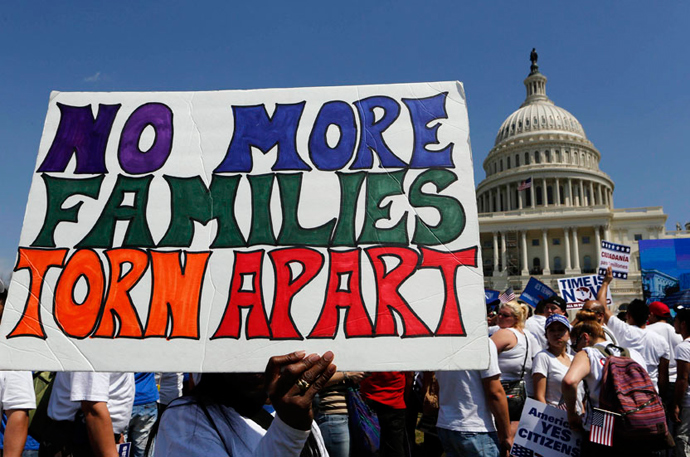
reform on April 10, 2013. Source: Reuters/Larry Downing
Being undocumented, you would think that I would be ecstatic about the immigration reform deal being negotiated in Congress. I stand to benefit directly from its passing. However, I find it highly problematic. I want to specify here that this is an analysis of S.744 only, the Border Security, Economic Opportunity and Immigration Modernization Act. The House is trying to pass individual bills which are, at press, even more conservative than the Senate framework.
In order to understand how we got to this point, we need to go back to 1996 and the passage of the infamous Illegal Immigration Reform and Immigrant Responsibility Act (IIRIRA). This Act was passed after the awful Oklahoma City bombings. At the outset of the investigation, “anti-terrorism experts,” in a predictable rush of Islamophobia, pointed fingers towards a potential “Muslim” and “foreign” suspect. The hysteria that followed convinced legislators to pass IIRIRA which, among many things, stripped due process from immigration courts, created the new legal term “aggravated felony” to make it easier to deport individuals with minor offenses, and made these changes retroactively. By the time investigators determined that the bombings were the result of domestic terrorism, it was too late: the law went into effect, and it was just the beginning of the scapegoating of immigrants in the then as-yet-unannounced “War on Terror.” 9/11 only made it official. Ever since then, politicians have merged the issue of National Security with our migration crisis, and that awful conflation has led to the passage of terrible anti-immigrant legislation. So it’s no wonder that the immigration deal currently being debated is largely a love letter to the defense and private prison lobbies, who both stand to make millions if the Senate bill passes.
Let’s talk about the path to citizenship. Many Republicans have derided S. 744 as “amnesty.” That is, of course, a lie. Most immigrants would go through a very long and arduous path to citizenship with many steps. All taken in consideration, most people are looking at a 13- to 15-year path to citizenship. All throughout this time, of course, the formerly undocumented would have no access to social services. This isn’t really fair if you consider the fact that undocumented people have been paying taxes for years for services they don’t have access to (which is why most economists see undocumented people as absolutely essential to the survival of programs like social security).
The longevity of the path to citizenship is not the real issue, however. The real problem lies with the new status for most formerly undocumented people called the “Registered Provisional Immigrant” (RPI) status, a status which is frighteningly easy to lose. The Senate bill has a “Continuous Employment” provision which would require that people in RPI status be continuously employed for at least ten years. Being unemployed for more than 60 consecutive days could result in loss of status and deportation. To add insult to injury, there is also a minimum earnings requirement to maintain RPI status: for the first six years, an RPI would have to make at least minimum wage and the remaining four years, would have to make at least 125% of minimum wage. We are in an economy where even college graduates have a very hard time finding employment and often have to work in low wage service jobs for years before truly beginning their careers. The undocumented population is largely low income; this provision will guarantee that a tremendous number of people will lose their status for lack of work and end up being deported. This is a continuation of the assault on workers’ rights. I can only describe this future extra-exploited pool of labor as indentured servants.
This is not the end of the bad news. Border militarization is at the heart of this deal. The Senate bill proposes to devote $46 billion to fund an electronic wall, drones, and 20,000 more border patrol agents. The defense industry is absolutely salivating over this. The sad thing is that despite the fact that we know migration from Mexico is currently at a net zero, migrant deaths at the border have increased as immigrants are seeking more desperate and more dangerous routes into the country. Economic despair is the driver of migration, not criminality. Thus, the only thing this beefed up wall will guarantee is the future deaths of migrants. This is why I was not one to cheer as Senators celebrated reaching this last compromise.
The bill is not all bad news, as it would allow many undocumented people to come out of the shadows and work legally. But we have to be clear that no matter what version of “immigration reform” we get out of DC, the struggle for migrants’ rights will continue.





